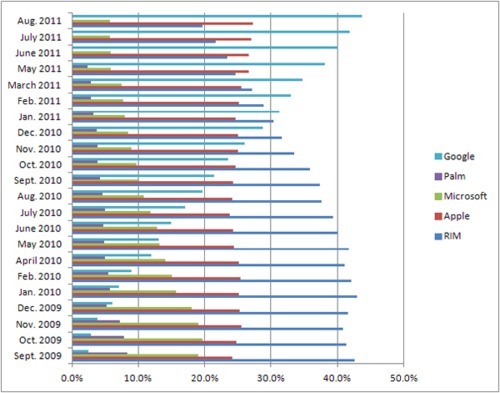Last autumn Steve Jobs passed away and everybody seems to agree: Steve Jobs was an inspiring and creative leader. His visionary view on technology stood at the basis of several radical innovations, which changed the lives of almost every single one of us. The fact that the iPhone, iTunes and the iPad are probably the three most important “disruptive innovations” of the last decade, surely isn’t a point of discussion. However, what does come to mind when debating about key issues of innovation at Apple’s is the fact if their way of innovation is future-proof. Apple has been blamed regularly that the company has proven to be more than average skilled to exploit the consumer by utilizing above-mentioned radical innovations. Which is an effective Business Model as long as there is a constant of flow of radical innovation finding its way through the funnel. But: is Apple’s methodology really sustainable?
Open Innovation:
Characteristic for a sustainable business model are the following 6 fundamental principles of Open Innovation:
- Not all the smart people in the field work for us. We need to work with smart people inside and outside the company.
- External R&D can create significant value: internal R&D is needed to claim some portion of that value.
- We don’t have to originate the research to profit from it.
- Building a better business model is better than getting to the market first.
- If we make the best use of internal and external ideas, we will win.
- We should profit from others’ use of our IP, and we should buy others’ IP whenever it advances our business model.
Let’s take a closer look on these elements:
Steve Jobs & Open Innovation:
- Steve Jobs has built its organisation around the best people. And the best people should work for Apple. The New York Times has published about this phenomenon:
“In choosing key members of his team, he looks for the multiplier factor of excellence. Truly outstanding designers, engineers and managers, he says, are not just 10 percent, 20 percent or 30 percent better than merely very good ones, but 10 times better.”
- Apple’s perspective on tapping into external using doesn’t comply with the “rules” of Open Innovation. This results in a paradox, because Apple’s products (iTunes, iPhone) are fundamentally changing our options on sharing knowledge with each other. Former Apple employee, Tasra Mar, argues:
Having worked there for a year, I know firsthand about the tight hold that is placed on knowledge and information—basically everything is on a need to know basis. No open discussions, forums or free conversations. That philosophy has paid off handsomely for them.
- As well as the former two principles, also this one isn’t acknowledged by Steve Jobs:
“To all outward appearances, Steve Jobs believes that knowledge and information confer power only if they are carefully guarded.” (Xconomy)
- To be honest, on this matter Apple’s needs to receive compliments. Steve Jobs has been able to combine both elements: creating and succesfully implement new business models (such as iTunes: The iTunes Business Model and its widespread effects) and focusing on a very short Time-to-Market (How Apple manages time-to-market thanks to Open Innovation).
- At least to the outside world, Apple seems to be a very intransparant company. The company isn’t open about new developments and outsources only very small elements of the production process. The role of Steve Jobs in this strategy is much-discussed and important
Jobs’ flippant communications style may not adversely affect Apple’s reputation or brand value, but a front-of-store employee telling a customer to “Please, leave us alone” surely would. (Rosanna Fiske).
- Sharing IP isn’t exactly one the stronger points of Apple, even not when it could contribute to Apples business. Apple is very conservative when it comes to sharing IP, while the current trends are moving opposite, such as Creative Commons, being Android an excellent example. The following table shows Android’s market share growing rapidly over the last few years. For those of you who now think: “Apples share isn’t doing bad as well”, I would like to point out that this is mainly due to the fact that iOS is an obliged system for a hugely popular device, not because the system itself is so popular.

(October Market Share report)
Conclusion: Steve Jobs is an innovator, not an Open Innovator per se.
Steve Jobs has proven to be running a very succesful company. However, that doesn’t answer the question: is Apple’s methodology sustainable and future-proof? Based on above-mentioned comparison: no, it isn’t. It seems to me that in the unfortunate case that Apple doesn’t continue creating disruptive innovations, their business model could fail in the near future. Or is Apple the perfect proof that Open Innovation may not be the only sustainable business model?
Ro be comprehensive, the author needs to take a stand and say if apple will keep its competitive advantage by not being open. Or at least explain why, despite not adhering to open innovation pri files, it managed to get an edge on its competitors, unless s/he agrees that the are limits to open information models.
Google “apple open innovation” and this article is the 4th result. As a product developer, I really like the sentiment in this article.
As for Apple, they had and are still having a very good run. Apple’s innovation did not pass away with Steve Jobs. But without another “1,000 songs in your pocket” level slam-dunk in the next ten years or so, they risk fading away. why? Because damn near anything Apple can do, its competitors can do far better. Its niche is in the bleeding edge. Without an open innovation strategy, I would say that Apple risks a great deal and forfeits more ROI than we’ll ever know.